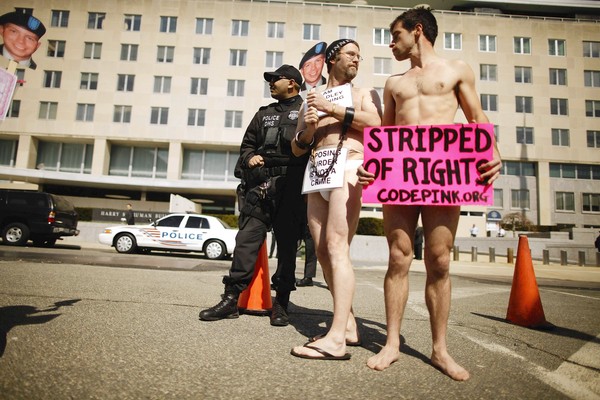Professors Bruce Ackerman and Yochai Benkler fired a salvo in the war against torture. They charge that the military under the Obama Administration is holding Private Bradley Manning “under degrading and inhumane conditions that are illegal and immoral.” The 23 year old Manning is accused of leaking classified government information to Wikileaks. Specifically, he is charged with illegally obtaining 250,000 U.S. government cables, 380,000 records related to the war and a military video of an attack on unarmed men in Iraq.
“For nine months, Manning has been confined to his cell for twenty-three hours a day. During his one remaining hour, he can walk in circles in another room, with no other prisoners present. He is not allowed to doze off or relax during the day, but must answer the question ‘Are you OK?’ verbally and in the affirmative every five minutes. At night, he is awakened to be asked again ‘Are you OK?’ every time he turns his back to the cell door or covers his head with a blanket so that the guards cannot see his face. During the past week he was forced to sleep naked and stand naked for inspection in front of his cell, and for the indefinite future must remove his clothes and wear a “smock” under claims of risk to himself that he disputes.”
Few realize that America has a long tradition of prisoner abuse.
George Washington was indeed morally opposed to torture. He hoped for his new nation to rise above the cruel practices of the past and instead treat his British captives with humanity. However, that hope soon faded as the realities of war set in. Washington came to see torture as a necessary evil in his bid to save American lives.
Washington was outraged by how the British were treating their American prisoners. He threatened the British that he would retaliate upon their men in his custody. With reports circulating that British employed “torture by searing irons and secret scourges,” Washington’s arguments for treatment “in kind” concerned gruesome practices. Washington even went as far as ordering his captives to draw straws for a random execution. In doing so, he made it clear that he would exact and eye for an eye in order to protect his people.
However, one of the many important differences between then and now is that Washington focused this mistreatment on foreign nationals rather than Americans. This is not to say that the American “traitors” were treated nicely. Loyalists were often beaten, tarred, and feathered (which may seem funny but could cause disfiguring burns, blindness, infection, and potentially death), and “spicketted.” Spicketting was a gruesome practice in which a giant screw was driven into the Loyalist American’s foot as a crow spun him around on it. But such abuse against Americans was not at Washington’s direction. While Washington did not always condemn these attacks, he did not see it as within the Commander in Chief’s power to order the mistreatment of Americans.
“President Obama was once a professor of constitutional law, and entered the national stage as an eloquent moral leader. The question now, however, is whether his conduct as commander in chief meets fundamental standards of decency.” There are many differences between then and now. What lessons might we learn from our past as we approach the challenges of today?

